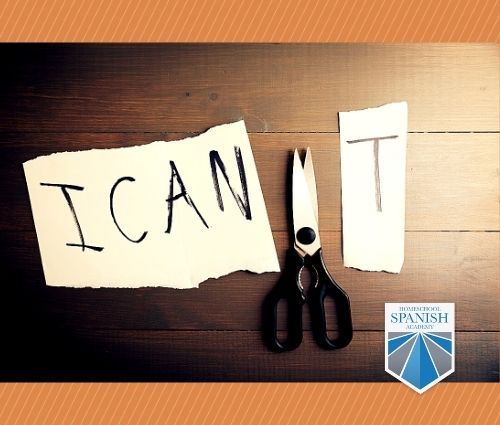
8 Power Tips to Be More Confident in Spanish
Learning Spanish as a second language is a lifelong process. Speaking confidently in Spanish is an achievable goal! To help you achieve it, I’ve prepared a list of 8 power tips that empower you to feel more confident in Spanish.
Before we dive into the tips, however, I want to take a moment to teach you some vocabulary.
Before being more confident, you should be able to say “confident” in Spanish! And there are many ways to talk about being confident in Spanish, so here is a list of words related to being confident in Spanish.
| Spanish | English |
| Seguridad | assurance |
| Certeza | Certainty |
| Confiado/Seguro | Confident |
| Determinación | Determination |
| Lo positivo | Positivity |
| Seguro de sí mismo | Self-assured |
| Conciencia de sí mismo | Self-awareness |
| Autoconfianza/confianza en sí mismo | Self-confidence |
| Autoestima | Self-esteem |
| Confianza | Trust |
Check out the definition of “confident” in Spanish here!
Why Confidence Matters
Feeling confident when speaking Spanish is important for your learning process. Talking in a new language can be scary! I don’t blame you if you feel a lack of confidence when talking in Spanish. I was lucky to be born in Guatemala and have Spanish as my first language. However, in my case, I had to learn English as a second language and I remember being terrified of talking out loud in class.
Don’t worry about it! It is normal to feel anxious when talking to other people. However, being confident in Spanish is key if you want to improve. You’ll never be able to see the progress you’re making if you’re too busy doubting yourself. And I’m sure you’re making a lot of progress!

The first step to feeling more confident in Spanish is to understand why you’re feeling afraid. Are you afraid of saying the wrong thing? Do you fear that other people won’t understand what you’re saying?
Understanding your fear enables you to know what to focus on. If you’re worried about pronunciation, then you can practice exactly that. If you’re afraid of talking to crowds, then you can start by talking to a small group of people and move up from there.
8 Power Tips to be More Confident
Here is a list of tips for you so you can be more confident in Spanish!
1. Don’t be afraid of failure
Failing is part of the learning process. There’s nothing wrong with failure. In fact, I encourage you to fail. Make mistakes! It is through mistakes that we learn.
Instead of focusing on the negative part of failing, focus on the positive. You committed 100 mistakes? Don’t let it get you down! Now you know a hundred things not to do and you can move on to the next one and get it right. Mistakes can show us the way.
When learning a new language, this is super important. In order to be successful talking in Spanish, you have to embrace that you’ll make mistakes. Even native Spanish speakers sometimes say the wrong thing!
2. Be aware of the areas you’re struggling the most
Being self-aware is important in any learning process, but especially if you want to be more confident in Spanish. We all struggle with different things. Some may find it harder to learn grammar, while others may struggle with pronunciation. Whatever your challenge is, recognizing it allows you to work on it.
There is no shame in needing more practice. If you struggle with reading comprehension, look for reading exercises! If you’re learning Spanish with a teacher, you can ask them for material so you can practice.
If you’re an intermediate Spanish learner and you want to practice your reading, check out B2 Reading Practice: Intermediate Spanish Reading Comprehension.
3. Affirm your strengths, talents, and accomplishments
Just like there are things you have to work on, I’m positive there are things you excel at! People who lack self-confidence tend to focus more on the negative. Don’t do that! You can accomplish many things.
In order to affirm these strengths and keep them fresh in your mind, make a list. Write down a list of all your strengths, talents, and accomplishments. You can also make notes with little positive messages and place them somewhere so you’ll see them often.
I like placing post-its by my desk with messages that keep me motivated. Little things like “I am talented” or “You can do this!”. When I’m stressed, I look at these messages, and I feel better right away.
4. Practice basic, everyday conversations
The only way of truly improving and feeling confident in Spanish is to get plenty of practice. If you’re having doubts when speaking Spanish, practice with the basic conversations.
Small talk, greetings, ordering food, shopping for clothes… these types of conversations that happen every day. Practice them as much as you can. Grow your confidence with basic conversations, and you can gradually hold longer and more complex conversations.
5. Set realistic goals
As much as we would like to learn everything fast, it is impossible. Sometimes, we’re overachievers and set goals that are too hard to attain.
There’s nothing wrong with pushing yourself, but it’s also key to set realistic goals. This goes hand-in-hand with being self-aware of the areas you need to improve. Once you know what you have to work on, set goals in order to achieve it.
Your achievements influence your self-confidence. You’ll feel better if you start seeing real progress, but you’ll never see that progress if you set goals that are impossible to reach.
You know yourself better than anyone else. You know what you can and can’t do. If you know you’re unable to read for a long time, don’t set goals to read a lot of books in a short amount of time.
Take little steps to achieve your goals. That way, you’ll be able to notice all the progress you’re making.
6. Stop comparing yourself to others
Everyone learns differently, and everyone’s progress looks different. Comparing yourself to others will cause more harm than good.
If you’re too focused on other people’s accomplishments, you’ll miss your own! Comparing yourself to others often leads to self-doubt and low self-esteem.
Understand that your learning process will be different from those around you. Instead of focusing on how much others seem to be accomplishing, focus on your own goals to feel more confident.
7. Surround yourself with supportive people
While being more confident in Spanish comes from within, it is helpful to have people supporting you.
Having a support system can do wonders for your self-confidence. It can be your family, friends, or classmates! When you’re feeling down, these people boost you up and remind you how great you are.
Surrounding yourself with inspiring and positive people will do wonders for your self-confidence!
8. Remove negative self-talk from your vocabulary
Words are powerful. Just as affirmations of your strengths make you feel more confident, if you’re constantly repeating negative phrases to yourself, your self-esteem suffers. Become aware of these negative self-talk phrases and remove them from your vocabulary.
Instead of saying “I don’t understand anything” say “I don’t understand this right now.” There’s nothing wrong with not understanding. And there will come a time when you’ll be able to understand it!
Become more confident in Spanish!
Practice works wonders for your self-confidence. So, why not sign up for a free class? You’ll be able to have real-time conversations with a native Spanish speaker teacher. Tell them what you want to focus on and notice how being more confident in Spanish helps your learning process!

Want more Spanish resources and fun content? Check these out!
- All You Need to Know About Spanish as a Second Language
- Discover the Joy of Learning Spanish with Summer Fun Activities
- Are Bilingual Children More Likely to Experience a Speech or Language Delay?
- Top 10 Places to Visit in Guatemala City, Guatemala
- Language Learning with Netflix: How to Use the Chrome Extension
- Turn Your Life Around: From Passive Bilingualism to Fluency!
- 15 Mouth-Watering National Dishes of Latin America
- 60 Best New Year Quotes in Spanish 2024
- A-Z: Beginner Spanish Word Lists for Kids + Free Flashcards - February 23, 2023
- Intermediate Spanish Reading Practice - April 5, 2022
- Free Spanish Lessons for Kids (Science, History, Basics and More) - February 21, 2022




